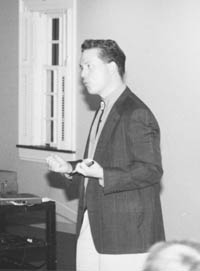Jeff Corntassel does not look indigenous. “This is what 500 years of colonization does to you,” he said, touching his light skin.
His point was that indigenous people are subtly pressured from all sides to assimilate, and on the surface, it may seem as though they have. But while the society around them wants them to be as much like everyone else as possible, indigenous people are still fighting for their rights as a separate culture.
Corntassel is the Associate Director of Human Rights at Virginia Tech and Cherokee representative to the UN. His lecture, “International Law at the Crossroads: New partnerships in the struggle for Global Indigenous Rights,” on Thurs, Sept. 8, was the fourth in the “Human Rights” series on campus.
Corntassel covered a lot that night, as he gave a self-described “crash course” through “the International Decade of Indigenous Peoples.” Starting with the Mayan farmers who revolted and became the Zapatistas in 1994, the decade ends in 2004, when the Draft Declaration of Indigenous People is to be ratified. “Though, I’ll be up front with you,” said Corntassel. “It will not be ratified by 2004.”
One of the major stumbling blocks in indigenous legislation is a lack of clear concept of what indigenous people are. A national government will have one idea, while the indigenous people themselves have another.
“Who is indigenous? How do you define indigenous? Everyone has a different definition,” said Corntassel. “Charlton Heston says he’s a Native American!”
Another obstacle is a blatant lack of respect for indigenous rights. At the Global Indigenous Rights Discourse in Geneva, (“For once, indigenous people overwhelm a European nation!” said Corntassel), the indigenous people are segregated from the state representatives. “This is OUR discourse,” exclaimed Corntassel. “And where do we sit? In the back.”
Indigenous nations get four minutes to represent their nation. Countries get fifteen minutes, “or if you’re Australia, as long as you want,” according to Corntassel.
Most state representatives have an attitude not entirely in sync with that of the indigenous representatives.
“I’m in Geneva, and I’m talking to a US representative,” recounted Corntassel. “And the whole time, I’m thinking, we’re having an international conversation, and the US rep says, no, it’s a domestic issue.”
Corntassel went on to say that “Indigenous people are the ‘Fourth World,’ invisible to their governments. Hence the need to go to the UN.”
As Corntassel finished the lecture, he talked of the recent groundswell of indigenous groups, and how the Internet has allowed increased communication between indigenous nations and their members. At the end, Corntassel summed up his relationship to the state government that owned the land he lived on.
“I can’t say I’m an American, because I don’t know what that means,” he said.
“I say I’m a Cherokee.”

